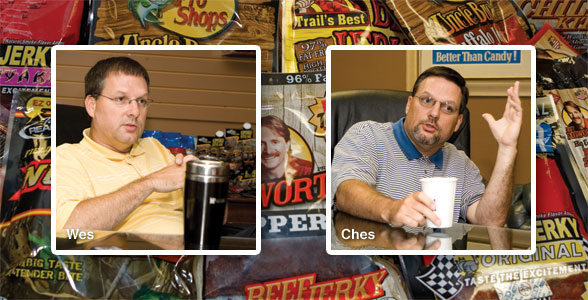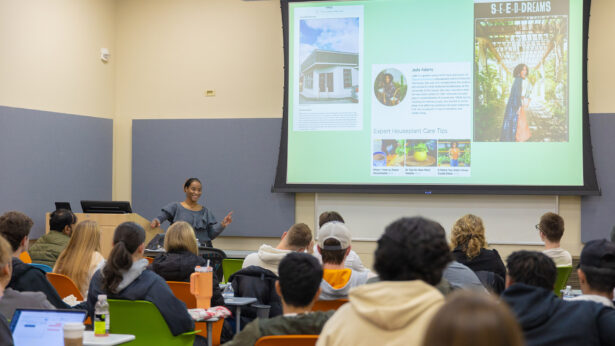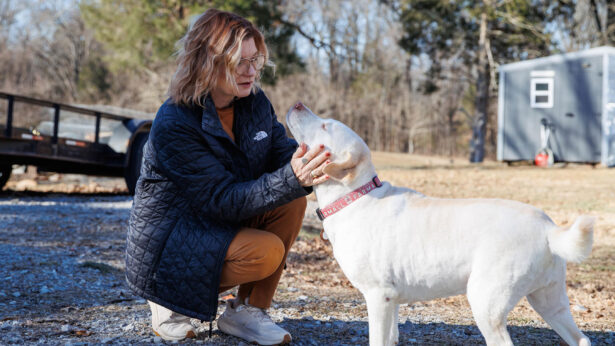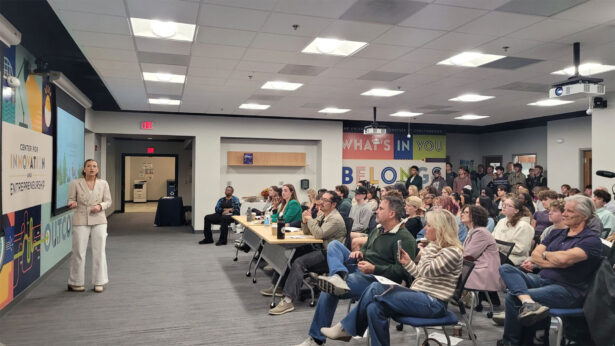When you ask them about their careers, twins Wes and Ches Jackson are quick to point out that no one really graduates from college and aspires to sell hot dogs. But in 1982, with UT Martin business degrees in hand, that’s exactly what they sold–along with other Reelfoot Packing Company products. Their father, Billy Joe, had worked for the Union City, Tennessee, Reelfoot plant most of his career, and his sons naturally gravitated there for jobs during high school and college to help finance their college educations.
That early experience in the food industry made indelible marks on the Obion County natives, who spent the first 25 years of their careers apart, both advancing in the corporate end of the food industry. Early on, their interest in sales earned them top management positions with such companies as Sara Lee Corporation and Con Agra Foods. (Wes was president of Sara Lee Dinner Group in Cincinnati, and Ches was vice-president/customer development for Con Agra Foods in Tampa, Florida.) More recently, it was their entrepreneurial bent that in 2004 led Wes to co-found and become president and CEO of Monogram Food Solutions in Memphis and Ches to join him 2 years later as president of Monogram Meat Snacks division.
“Once we got into the business, I think both of us would tell you we figured out that sales, and sales in the meat business, was a pretty good gig,” Ches says. “I don’t think either one of us has ever considered leaving the food business.”
And they value not only their years of experience in the corporate world but also their business degrees from UT Martin that got them started. Speaking of UT Martin’s business department, Ches says, “I believed then that it had a very fine academic curriculum, and I believe it still does.”
“We were proud of the education and felt like, from a business-school perspective, that we were ready to conquer the world,” Wes says. But, he adds, “If it were not for the experience gained working in a large corporate environment, then it would make it very difficult to do what we’re doing.”
The brothers and the Monogram management team, including Karl Schledwitz (Knoxville ’74), UT Board of Trustees member, have taken the company in a myriad of exciting directions, especially in the area of food product licensing. Monogram has licensing agreements with Jeff Foxworthy and NASCAR for varieties of meat snacks and Emeril Lagasse for a line of gourmet coffees. Meat and meat snacks–beef jerky, smoked sausages, hot dogs, bacon, and sandwich meats–are produced in the company’s Chandler, Minnesota, manufacturing plant. Another plant in Muncie, Indiana, currently being acquired, produces breaded meat patties and corn dogs. Monogram also has the well-known regional brands King Cotton and Circle B meats in its family of products. The company acquired the meat snacks division and the King Cotton and Circle B brands from Sara Lee. Extending its reach, Monogram also produces meats and meat snacks as private labels for several national companies.
Licensing continues to be one of the most exciting aspects of Monogram’s business. The company’s business development strategies often begin with “What if?”
“We make most of our own products in our manufacturing facility,” Wes says. “We try to find brands that have equity that complement our production capabilities.” As an example, he says, it seemed like a natural for Southern humorist Jeff Foxworthy to have a line of beef jerky and meat snacks that Monogram markets as its own brand, paying Foxworthy a royalty. The same applies for the NASCAR line of products. A partner in Seattle produces the gourmet coffee that is aptly named for Emeril Lagasse.
Wes and Ches have similar characteristics and business acumen, but they opt for a divide-and-conquer approach using each one’s particular strengths to help lead the organization. “In a small company where resources are always at a premium, there’s not a lot of room for redundancy, so you figure out who’s going to be in charge of what, and you run with it,” says Ches. He calls himself the day-to-day operations chief, focusing more of his energy on execution and continuous improvement, while Wes heads up the King Cotton and Circle B brands and spearheads business development “trying to land the next deal.”
“It’s certainly not split between Wes and me,” says Ches. “There’s a lot of intellectual horsepower here that adds value.”
Wes adds, “We are so fortunate to have such a great group of hard-working, talented people,” many of whom worked with the brothers earlier in their careers. The management team is made up of people who are exercising their entrepreneurial instincts. “The reality is if you don’t have it [entrepreneurial spirit], you wouldn’t be here,” says Wes. “It’s just a different satisfaction when you’re working for a private organization . . . and the decisions you make as a team clearly impact a lot of people’s lives.”
Wes and Ches, who were inseparable from childhood through college, are glad to be working together again. They also like living close to their father, Billy Joe, and mother, Evelyn. And they enjoy each other’s families. Ches and his wife, Susan, are the parents of two sons, 18-year-old Palmer and 7-year-old Hamilton, and a 16-year-old daughter, Kelsey. Wes and his wife, Suzanne, have a 9-year-old son, Cole, and 3-year-old twins–daughter Sidney and son Tate.
Looking to the future, Wes and Ches agree that Monogram Food Solutions is “where we want to be.” In the early stages, Wes recalls, “We were talking with NASCAR [officials], with Emeril Lagasse, and with Jeff Foxworthy simultaneously. I would say the goal at the time was if we could get any one of these licensing deals, then that would be validity; it would be a good start to our business. As it turned out, not only did we get one of them, we got all three. Those moments for me were very exciting, kind of defining moments, because I knew that the risk we had taken would pay off.”
“If you look at the brands and what we’ve got in manufacturing ready to go to market, we think we’re ahead of where we need to be,” Ches says. “We’ve got two to three years of really good, hard work to make sure these brands deliver what we think they should.
“Today, we have a plateful. We’re just making sure we execute very well against what we’ve already put in place,” Ches says. “We want to take what we’ve got and build it into a really solid long-term national business, and then we will plug in and bolt on where it’s a strategic fit. We have an appetite for growth.”



